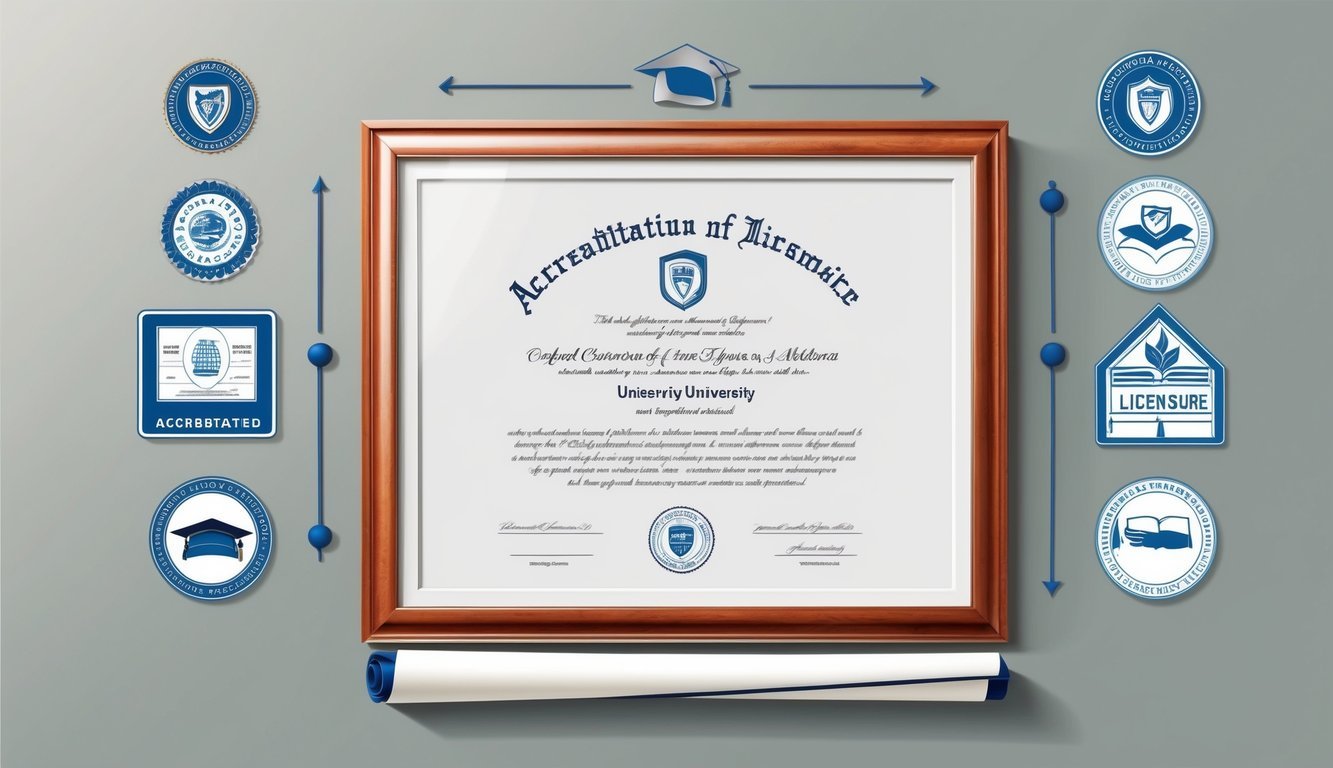A Bachelor of Science in Nursing (BSN) degree is a four-year program that prepares you to become a registered nurse.
This degree not only equips you with essential nursing skills but also opens doors to better job opportunities and higher salaries.
With more healthcare employers prioritizing BSN degrees, pursuing this path can enhance your career prospects in a competitive field.
In a BSN program, you’ll engage in both classroom learning and clinical experiences that allow you to apply your knowledge in real-world settings.
These experiences help build your confidence and prepare you to handle various medical situations.
Furthermore, obtaining a BSN can lead to advancements in your nursing career, such as leadership roles or specialized positions in healthcare.
As you consider a nursing degree, understanding the prerequisites, curriculum, and career outlook is crucial.
Exploring various nursing programs can help you find one that fits your needs and goals.
Key Takeaways
- A BSN degree is essential for a successful nursing career and better job opportunities.
- The program includes a mix of theoretical knowledge and practical clinical experiences.
- Higher education in nursing can lead to advancement in roles and specialization options.
Understanding BSN Degrees
A Bachelor of Science in Nursing (BSN) prepares you for a rewarding career in healthcare.
This degree not only enhances your nursing skills but also increases your job opportunities and potential earnings.
What Is a BSN?
A Bachelor of Science in Nursing is a four-year degree that covers essential nursing education, including patient care, health assessment, and nursing ethics.
Programs typically require around 120 credits and include both classroom instruction and clinical practice.
With a BSN, you can take on more responsibilities compared to those with an associate degree in nursing (ADN).
You will be qualified for a wider range of positions and specialties.
Many hospitals prefer or require nurses to have a BSN due to increasing complexity in patient care.
You can learn more about nursing education and program details on Nurse.org.
Types of BSN Degrees
There are different pathways to earn a BSN, catering to various educational backgrounds.
Here are some popular types:
| Type of BSN Program | Description |
|---|---|
| Traditional BSN Program | Designed for new students, this is a full-time, four-year program. |
| Accelerated BSN Programs | For those with a prior degree, this program can be completed in 12-18 months. |
| Online BSN Programs | Offers flexibility for working individuals, allowing for coursework completion online. |
| RN-to-BSN Programs | Designed for registered nurses with an ADN, this program typically takes about 1-2 years to complete. |
Each type has its own benefits, so you can choose what fits your situation best.
Consider your current education and career goals when selecting a program. For details on RN-to-BSN programs, check out RnCareers.org.
Prerequisites and Admission Requirements
Before applying to a BSN program, it’s essential to understand both the academic prerequisites and the application components required for admission.
Meeting these requirements can increase your chances of acceptance into the program of your choice.
Academic Prerequisites
To be eligible for a BSN program, you typically need to complete specific prerequisite courses.
Commonly required courses include:
- Anatomy and Physiology: Understanding the human body is crucial for nurses.
- Pharmacology: This course covers medication and its effects.
- Health Assessment: You’ll learn how to evaluate patient health.
Many programs also require a minimum GPA, usually around 3.0.
Having strong grades in your prerequisite courses can enhance your application.
Some programs may ask for official transcripts to verify your coursework completion.
Application Components
When applying to a BSN program, you must prepare several components.
Key elements often include:
- Completed Application Form: Most programs offer an online application.
- Official Transcripts: Schools will require transcripts from all attended institutions.
- Standardized Test Scores: Some programs ask for SAT or ACT scores.
It’s important to check each program’s specific requirements, as they may vary.
You can find detailed information on application processes on sites like NurseJournal.org.
Preparing these materials ahead of time will help streamline your application.
Curriculum and Clinical Experience

In a BSN program, your education will be divided into core nursing classes and hands-on clinical experiences.
Both elements are essential for preparing you to provide high-quality patient care in various healthcare settings.
Core Nursing Classes
Your education will include a range of core nursing classes that cover the fundamentals of nursing and healthcare.
Key subjects often include:
- Health Assessment: Learn how to evaluate patients’ health status effectively.
- Pathophysiology: Understand the physiological processes behind diseases.
- Pharmacology: Study medications and their effects on the body.
- Community Health Nursing: Focus on the health of populations and communities.
These classes emphasize evidence-based practice and nursing research, making sure you are well-prepared to apply the latest findings to patient care.
You will also explore nursing leadership skills, which are vital for future career advancement in the healthcare system.
Clinical Rotations and Hours
Clinical rotations are a crucial aspect of your BSN education, allowing you to apply your knowledge in real-world settings.
Generally, you can expect to complete around 700–800 clinical hours throughout your program.
During these rotations, you will work with various patient populations in different healthcare environments.
This experience helps you to develop practical skills in:
- Patient Care: Learn how to provide compassionate and effective care.
- Evidence-Based Practice: Apply research to decision-making.
- Healthcare Team Collaboration: Work alongside nurses, doctors, and other professionals.
These clinical hours are often spread across multiple specialties, including pediatrics, geriatrics, and mental health.
This broad exposure is essential for understanding the complexities of patient care in diverse settings.
Licensure and Accreditation

When pursuing a Bachelor of Science in Nursing (BSN) degree, understanding licensure and accreditation is crucial.
You need to pass a licensing exam to practice as a registered nurse (RN), and accreditation ensures the quality of your nursing program.
Licensure Exam
To become a registered nurse, you must pass the NCLEX-RN exam.
This exam is designed to test your knowledge and skills to ensure you can provide safe and effective care.
Here are some key points about the NCLEX-RN exam:
- Eligibility: You must graduate from an accredited BSN program to sit for the exam.
- Content Areas: The exam covers four major categories: Safe and Effective Care Environment, Health Promotion and Maintenance, Psychosocial Integrity, and Physiological Integrity.
- Pass Rate: The NCLEX-RN pass rate varies by state and institution, so be sure to check the statistics related to your schools of interest.
Accrediting Bodies
Accreditation is important for your nursing education.
It affects your eligibility to take the NCLEX-RN and can impact your job prospects.
The two main accrediting bodies for nursing programs are:
| Accrediting Body | Focus |
|---|---|
| ACEN (Accreditation Commission for Education in Nursing) | Focus on nursing education and practice |
| CCNE (Commission on Collegiate Nursing Education) | Focus on baccalaureate and graduate-level nursing programs |
Graduating from an accredited BSN program ensures that your education meets the required standards.
It can also enhance your career opportunities, as many employers prefer or require a degree from an accredited institution.
Career Outlook and Advancement
Earning a Bachelor of Science in Nursing (BSN) opens many career pathways and potential advancements.
This degree not only increases your job opportunities but also enhances your salary potential.
Nursing Career Opportunities
With a BSN, you can explore various roles in the healthcare field.
The demand for registered nurses (RNs) continues to grow, and the BLS projects an addition of 371,500 RN jobs from 2018 to 2028.
Consider positions such as:
- Registered Nurse (RN)
- Nurse Practitioner (NP)
- Clinical Nurse Specialist
- Health Services Manager
Many employers prefer candidates with a BSN, often leading to better career prospects.
The average annual salary for RNs is approximately $86,000, with higher salaries for advanced roles.
Further, bridge programs like LPN-to-BSN allow you to transition from licensed practical nursing to a more advanced nursing role.
Further Education and Specialization
Pursuing further education can enhance your skills and career options.
After earning your BSN, you might consider:
- Master of Science in Nursing (MSN)
- Doctor of Nursing Practice (DNP)
These degrees allow you to specialize in areas such as nurse midwifery or healthcare leadership.
Educational advancement often leads to increased earning potential.
For example, nurse practitioners can earn upwards of $110,000 annually.
Additionally, leadership skills gained in advanced programs prepare you for managerial roles in healthcare settings.
Specialization not only boosts your career but also addresses the evolving needs of the healthcare system.
Frequently Asked Questions

When considering a Bachelor of Science in Nursing (BSN) degree, you likely have many specific questions.
This section addresses key concerns, including admission requirements, program formats, salary impacts, state differences, career advancements, and distinctions among nursing degrees.
What are the primary requirements for obtaining a BSN degree?
To obtain a BSN degree, you typically need a high school diploma or equivalent.
Most programs require you to complete prerequisite courses in subjects like biology and chemistry.
Additionally, you will need to pass an entrance exam and submit letters of recommendation in many cases.
How do online BSN degree programs compare to traditional on-campus programs?
Online BSN programs offer flexibility for students who balance work and family.
These programs often provide the same curriculum as on-campus options.
However, on-campus programs may offer more hands-on experience through labs and clinical settings, which can be crucial for nursing practice.
In what ways does holding a BSN impact a nurse’s salary compared to an RN without a BSN?
Nurses with a BSN generally earn higher salaries than those with an associate degree.
Studies show that BSN-prepared nurses can earn approximately 10-20% more than their RN counterparts.
Employers often offer better opportunities for those with a BSN due to the advanced skills and knowledge gained through the program.
What are the differences between BSN programs offered in different states, such as California?
BSN programs may differ in length, cost, and admission standards from state to state.
For instance, California has a variety of public and private institutions to choose from.
Each program may also have specific partnerships with hospitals for clinical placements, which can enhance your learning experience.
How does a BSN degree affect career advancement opportunities in nursing?
A BSN degree opens the door to more advanced roles in nursing, such as management and specialized fields.
Many employers prefer or require nurses to hold a BSN for leadership positions.
With a BSN, you also become eligible for further education, like a Master of Science in Nursing (MSN).
What is the distinction between the various levels of nursing degrees?
Nursing degrees typically range from diplomas and associate degrees (ADN) to bachelor’s (BSN) and master’s (MSN) degrees.
A BSN encompasses a broader education than an ADN, including leadership and critical thinking skills.
Each level prepares you for different roles and responsibilities within the healthcare system.

